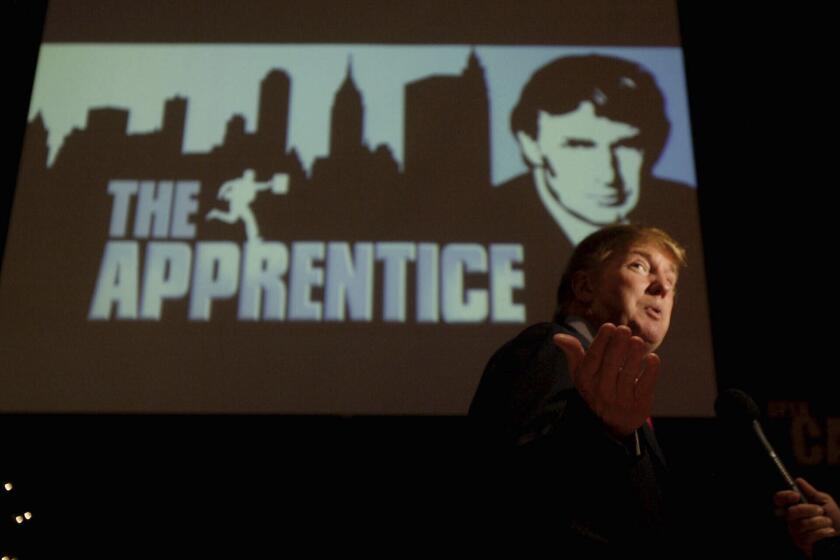Patt Morrison Asks: Breakup artist Laura Wasser
Seriously? Someone in L.A. who doesn’t want to show up on TV?
One of the city’s foremost divorce attorneys won’t say word one about her client Maria Shriver’s divorce from Arnold Schwarzenegger. It is probably Laura Wasser’s highest-profile case, which is saying something, considering her client list includes Angelina Jolie, Britney Spears and Mrs. Mel Gibson. Her services will run you $750 an hour -- unless you’re a client at the nonprofit Harriett Buhai Center for Family Law, which serves poor, abused women, and where Wasser volunteers. With the definition of family now as elastic as the cord on an accordion-style legal file -- Wasser herself has a live-in beau and two children; she’s shown here with the younger, Jack -- she stipulates to her thoughts on capital-D divorce in the capital of celebrity.
You were a baby when no-fault divorce came to California in 1969. People no longer had to prove cruelty, desertion or adultery to get divorced. It radically changed family law.
Interesting, isn’t it? Almost all of the states now are no-fault. In this day and age, with Photoshop, it would be really difficult to have fault because the evidence [could] be doctored. It makes more sense to have no fault. My clients may have myriad complaints about their spouses, and I say: That may be the case, but it’s completely irrelevant to our case. Unless we’re talking about serious drug, alcohol or abuse, it’s not going to affect anything having to do with custody either. He or she can be a complete jerk and is still going to be able to be a parent to your children.
Before no-fault there was “Divorce Court”-style melodramatic testimony, the juicy details of marital discord.
You’ll still hear these things because people need to vent. But it doesn’t matter [legally]. Can it shape a judge’s opinion about the person being discussed? Yes. Should it? No. Add the third facet, which is media; you certainly have cases very much in the limelight.
To paraphrase Diana, the Princess of Wales, there are three in those divorces: wife, husband and the paparazzi.
I’ve had debates with people in your industry about the public benefit to find[ing] out private information about an individual going through a divorce. I’m a huge proponent of the 1st Amendment, but why should that be available? Normal average Joes who get divorced don’t have E! Entertainment or CNN reporting on [their] divorce. If I had my druthers, I would make marital filings sealed, as paternity filings are sealed in California.
You also seem to put a premium on keeping your own low profile.
I don’t think it’s fair to make the worst time of somebody else’s life a kind of career booster. When some people hire me, maybe that’s not the primary reason, but it definitely might be in the top five.
So we won’t see you at the microphone like, say, Gloria Allred?
You absolutely never ever will.
What do you think about movements to make it harder to get married, or to make marriage a renewable contract?
Generally I don’t believe the government should have that paternalistic a [role] in our relationships. That having been said, in “Parenthood,” Keanu Reeves says you need a license to have a dog, even a license to fish, but any [jerk] can become a father. Or get married.
Maybe there should be a couple of hoops to jump through -- not governmental hoops, but something so a week later you don’t wake up and go, “Wait, who are you?”
Divorce rates went up after no-fault. Is that good or bad?
I’m not going to say divorce is good, but you don’t see people staying in unhappy marriages as much as you did. They realize that it may be better for their children to see what a happy parent looks like rather than miserable parents under the same roof. Being able to solve that problem, and then moving [clients] on to a new situation, is what gets me through; it makes me like my job.
It’s assumed that in no-fault divorce, women get the short end of the financial stick.
In the last 10 years, I’ve seen more cases where, if there were fault, it would be detrimental to the women. We may have a skewed understanding of who’s having extracurricular affairs. I’m representing husbands making enough money to be paying the rates our firm charges, and the husband says, “How did this happen? I’m working my butt off so we can go on the trips to Aspen and she can drive the nice car and go to yoga and get the Botox, and then she’s sleeping with the tennis coach!” I’m seeing much less contrition with women.
Why did you become a lawyer? Did your father, with whom you practice, push you?
I wouldn’t say he pushed me. I was conceived the night he found out he had passed the bar exam. I think they figured, OK, there’s going to be an income stream, let’s have a baby! He and my mother decided to make my initials LAW: Laura Allison Wasser. When I wanted to bargain for [an] allowance or a pair of designer jeans or my curfew, there was always a legal pad involved. But they never said, “Oh, you should be a lawyer.”
Why this kind of law?
I was waiting for my bar results. I went to work for my dad’s firm as a clerk. I really needed the money. And I liked it. You get to learn about different walks of life and personalities. Being, for example, an entertainment attorney who has the same client for years on end is not nearly as interesting to me.
Are you one of those lawyers someone hires preemptively, as in a war: “They have 50,000 nuclear warheads; we might as well make peace”?
I don’t think so. I think my reputation is that I’m settlement-oriented. I say to my clients, you will be lucky if you never see the inside of a courtroom. The level of animosity and expenditure if that happens is enormous. You may really like me right now, but I guarantee you’re not going to like writing me checks for half a million dollars, and I double guarantee you’re going to hate writing them for your [spouse’s] attorney if you end up paying [those] fees. It’s much more that than “Oh God, Laura Wasser, she’s scary.” There are [lawyers] who don’t have that much of an interest in resolving it right away, because if it’s resolved, you’re not getting a paycheck.
Your own marriage was annulled.
I got married in 1993. We were both babies; right after I took the bar we split up. We didn’t have any kids. We’re still good friends. My father said, “See whether you can annul it,” so we did. Then my wedding picture hung in the wedding office of the Bel-Air for the next five years; so much for the annulment!
You didn’t have a prenuptial agreement; should everyone?
It depends on your financial situation. [Prenups] cannot and do not touch on anything having to do with child custody and child support. Whether or not you have a prenup, it’s important going into a marriage to have some very frank conversations. That may sound really lawyerly, but in every relationship there’s the consideration: What are each of our responsibilities? I find young people, particularly in the entertainment industry, enter into these marriages without having those kind of frank conversations, and that’s what leads to problems later.
Some people think a prenup takes the sheen off a romance.
That’s a bogus argument. You don’t want to be having your dress fittings at the same time you’re negotiating the prenup. You get it done; you put it out of the way. It’s not a fun conversation to have, but guess what else isn’t fun? Sitting down and writing a will. Not fun, but you’ve got to take care of it.
Is there any such thing as an ideal divorce?
Ideal? There are plenty of divorces [where] people come in and say, “We love each other and care about each other but we’re not happy together anymore.” There’s no mystery to this; it’s not rocket science. “We’ve got X amount of money and these properties and here are our kids and here’s what we’ve worked out. Can you write this up for us?” Absolutely. That’s the way to do it. You spend far less money, your children understand that you each love them and it’s totally doable.
What are some myths about divorce?
One big myth: I often have male litigants call and say, “I know if I get divorced, I’m going to be an every-other-weekend father, because she’s the mom and she’s going to get custody.” Not true anymore, at least not in Southern California. If you’re a hands-on parent, and if you [can] be there for your children, there’s no reason why you wouldn’t have as much or more custodial time as your female counterpart.
Are there movies or TV shows about law that you like?
I love “The Good Wife.” The legal scenes are really what we go through. I worked a long time ago on “Liar Liar,” starring Jim Carrey. I was the technical advisor. I’d tell them what they could and could not do in [a] courtroom. But probably 70% of what I told them, they’d say, “We’re just going to take creative license with that because it makes a better story.”
Has your work made you cynical about relationships?
No. If you have a television and a computer, you could be cynical about relationships. My dad once said that in criminal law you see terrible people on their best behavior; in family law you see great people on their worst behavior. I also believe that [a lawyer can] help get them to the other side and people are so relieved and so appreciative.
I say this to my clients: If you’ve been with someone long enough to go through a pregnancy and the delivery room and all that stuff, if you can’t find something to sustain a smile at a [kid’s] dance recital or a graduation, there may be something the matter with you. For all those passionate hateful feelings [in] the breakup, there must be some moment you had with this person that can carry you through that two-hour karate exhibition. If you can’t do that, I am going to be a little judgmental. That’s not OK. Figure it out.
This interview was edited and excerpted from a longer taped transcript. Interview archive: latimes.com/pattasks.
More to Read
A cure for the common opinion
Get thought-provoking perspectives with our weekly newsletter.
You may occasionally receive promotional content from the Los Angeles Times.











